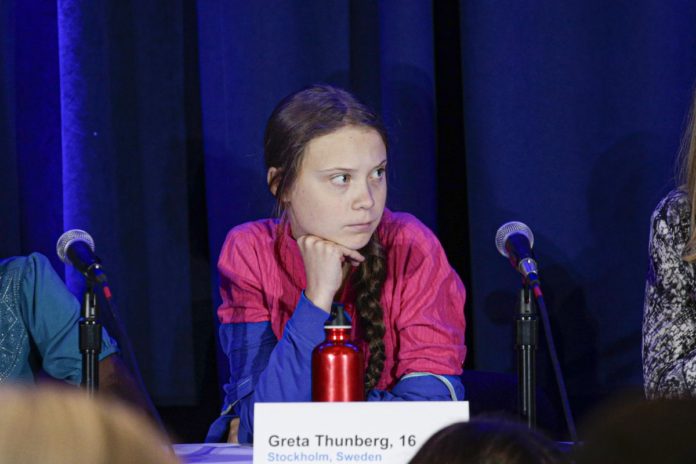 Her young face contorted with anger at the politicians and business leaders before her, 16-year-old climate activist Greta Thunberg provided the unforgettable moment of the United Nations Climate Action Summit in New York.
Her young face contorted with anger at the politicians and business leaders before her, 16-year-old climate activist Greta Thunberg provided the unforgettable moment of the United Nations Climate Action Summit in New York.
“You have stolen my dreams and my childhood with your empty words. And yet I’m one of the lucky ones. People are suffering. People are dying. Entire ecosystems are collapsing. We are in the beginning of a mass extinction, and all you can talk about is money and fairy tales of eternal economic growth. How dare you!”
For many, the teenager’s blunt assessment stood as a vital riposte to the apathy and selfishness of leaders content to appear at international summits yet unwilling to take tough decisions to avert a climate catastrophe.
Those who believe that governments are moving far too slowly to limit global temperature rises had plenty to back up their arguments in New York. No headline-grabbing commitments were made by the US and China, the world’s biggest emitters, while a disengaged President Trump made only a fleeting visit. For delegates from Africa, which is disproportionately impacted by climate change, the meeting served to reinforce a disturbing lack of progress. In a General Assembly speech just days after the summit, President Idriss Déby of Chad echoed Thunberg’s pessimism.
“The absence of tangible results compared to commitments made impacts the fight against climate change, and this in spite of the immense hope that was generated by the historic Paris Climate Agreement,” he said. “The grave consequences of climate change are being felt in Africa more than anywhere else, and in particular in the Sahel.”
And yet, while realistic about the conference’s shortcomings, UN diplomats insist that the Climate Action Summit was a successful staging post on the way to bolstering the 2015 Paris Climate Agreement.

At the summit, 65 countries and major sub-national economies committed to cut greenhouse gas emissions to net zero by 2050, while 70 countries announced they will either boost their nationally determined contributions (NDCs – the contribution each country makes to reducing emissions) by 2020, or have started the process of doing so. UN secretary-general António Guterres says that is just the beginning.
“If our world is to avoid the climate cliff, far more is needed to heed the call of science and cut greenhouse emissions by 45% by 2030; reach carbon neutrality by 2050; and limit temperature rise to 1.5C by the end of the century. That’s how we can secure the future of our world.”
At the heart of that is his bid to follow up on summit pledges to strengthen NDCs. Given the urgent climate situation – scientists say that only by limiting temperature rises to 1.5 degrees above pre-industrial levels by the end of the century can we prevent the most catastrophic effects of climate change – there is even more pressure on the world’s largest emitters to enhance their plans.
China, the world’s largest greenhouse gas emitter, is on track to meet its 2030 NDC, but the plan is not ambitious enough to limit warming to below 2 degrees, let alone 1.5 degrees, according to the Climate Action Tracker. It deems the plans of the United States, which abandoned the Paris Agreement under President Trump, “critically insufficient” and similarly unable to reduce temperatures below 2 degrees.
For many of the world’s most vulnerable countries – including African countries praised for delivering ambitious plans – the 2020 COP26 climate summit in Glasgow, UK, will provide a critical indicator of whether the rich world will follow through on its commitments. Luis Alfonso de Alba, the Secretary General’s special envoy for the Climate Action Summit (see also interview, pages 20-21), said that the revised NDCs are crucial but counsels patience.
“You have to be aware there are a number of major emitters which are beginning to come on board but in some cases to formalise that will take some time. I think we are on the right track, it’s a process that’s supposed to end by the end of next year, and you have to be aware of that.”
Africa needs financial support
And yet ensuring that the largest emitters commit to ambitious NDCs is only one front in Africa’s war against climate change. Of equal importance is the urgent need for expanded financial support to mitigate and adapt to the effects of climate change. In 2009, the most industrialised nations pledged to help the poorest by providing $100bn in aid each year by 2020. But a terse Idriss Déby did little to hide his disappointment with the level of financial support on offer to Chad.
“The Paris Climate Agreement is only credible if it is accompanied with tangible action to respect and honour the commitments taken by all parties… I would like to underscore the crushing need to honour the commitment that was made by developed countries to mobilise $100bn a year by 2020 to meet the needs of developing countries for mitigation and adaptation. The full operationalisation of the Green Climate Fund is urgent in this regard.”
Here again, the summit can point to some progress. Twelve countries in New York made new financial commitments to the Green Climate Fund, the mechanism to assist developing countries with adaptation and mitigation, including France, Germany, Norway and the UK. The UK pledged to double its overall international climate finance to £11.6bn for the period from 2020 to 2025, and a Climate Investment Platform was launched which will seek to mobilise $1 trillion in clean energy investment by 2025 and support 20 least developed countries in its first year. Yet President Edgar Lungu of Zambia echoed Déby’s call for more.
“We’ve seen with our own eyes the devastating impact climate change has had on our environment… As a developing country Zambia needs assistance to enhance our capacity in key areas such as scientific research, early warning, rapid response and transfer of appropriate technology to help cope with the negative impact of climate change.”
Given the huge level of financing required, the UN urged the private sector to play a bigger role. A group of the world’s largest asset-owners – responsible for directing more than $2 trillion in investments – committed to move to carbon-neutral investment portfolios by 2050. That dovetailed with calls in New York by Akinwumi Adesina, president of the African Development Bank, to crowd in private sector cash.
“The amount we need for adaptation is only between $7-8 to $15bn a year. We are going to be working with pension and sovereign wealth funds to direct financing to green growth, because 75% of adaptation is going to come from the private sector. It’s in Africa’s interests to have indigenous ways of financing green growth.”
While Africa must continue the long struggle for financial support beyond this summit, the New York meeting struck a powerful symbolic chord, particularly in the evident solidarity between developing world leaders and an unlikely Swedish teenager.
“A lot of the people that made statements have said it’s not time for negotiation, that’s been done, it’s not time for simple debate, it’s time for action,” said Mohammad Mahmood Abubakar, Nigeria’s minister of the environment. “I was just so moved by [Thunberg’s] statement and I agree in totality with what she has said.”


